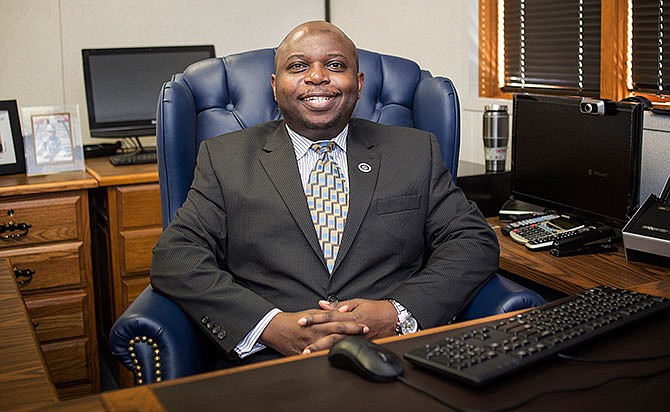For about 600,000 Missourians, being deaf and hard of hearing is a reality.
A sub-group of hearing-impaired individuals also live with vision loss and blindness. They are often left to depend on family members to help them with everyday activities.
"When these family members are not available, their world comes to a standstill," said Opeoluwa Sotonwa, executive director of the Missouri Deaf and Hard of Hearing Commission.
He and his team are advocating for a House bill that would provide Support Service Providers (SSPs) to deaf-blind individuals throughout the state. While many know the story of Helen Keller, the famous deaf-blind woman who went onto to become an author, political activist and lecturer, Sotonwa said most do not know about Anne Sullivan, Keller's teacher, interpreter and friend.
The legislation would give more deaf-blind individuals access to SSPs, like Sullivan, leading them to opportunities they may not know otherwise.
"This bill would expand opportunities for independent lives and self-determination for deaf-blind people by providing them with support they need to reach their potential," Sotonwa, who has been in his position since July 2014, said.
In many states, Sotonwa said the deaf-blind community relies on SSPs, who are trained sight guides providing audio and visual information, giving deaf-blind people greater independence by assisting with job interviews, meetings, shopping, medical appointments, banking, community or social events, as well as employment and in-home activities.
"Imagine trying to make a trip to the bank if you are unable to hear and see," Sotonwa said. "How would you know where to find the teller? How would you know the amount written on a check? Or the type of dollar bill you are holding? If an emergency was happening, how would you know? On top of all of this, how would you get to and from the bank? These are small tasks we take for granted that are not possible for many deaf-blind people without an SSP. When someone is there to communicate environmental information, it makes a huge difference in the possibilities for deaf-blind people to have independent lives."
Before coming to Missouri, Sotonwa worked for the Kentucky Commission for the Deaf and Hard of Hearing. He grew up in Nigeria, where he attended public schools and moved on to the Federal College of Education. There, he studied deaf education and English. He attended the University of Ilorin to study law, then continued his education at a Nigerian law school. Sotonwa earned his spot on the Nigerian bar. After coming to the United States, he attended the Howard University School of Law in Washington, D.C., and graduated with a LLM degree.
Sotonwa grew up as a hearing person, learning to speak and write in different languages. He considered becoming a polyglot, but his life changed at 16 when he became deaf.
At the time, Sotonwa said he was in denial and refused to identify as a deaf person, which is typical for people who developed deafness later in life. The society he lived in didn't value education for those with disabilities, he said, and Nigeria had no laws similar to the U.S. Americans with Disabilities Act.
"It was a big adjustment for my family and me," he said. "One bright morning, I was standing in front of our house when two deaf people walked by, flinging their hands into the air and laughing. I could see they were very happy and shared a common language. I was mesmerized and set on learning all I could about sign language and deaf culture."
After experiencing discrimination in Nigeria, Sotonwa made it his life's pursuit to advocate for the deaf.
"Having the privilege to work to improve access, accommodations and the quality of life for all deaf and hard-of-hearing people in Missouri is a blessing and a dream come true," he said.
The deaf, deaf-blind and hard-of-hearing communities face the challenges of communication barriers and inequality, Sotonwa said. Doctors refuse to provide "reasonable accommodation" despite laws that stipulate otherwise. The commission, a state agency, consistently endures funding obstacles, and Sotonwa said the commission has partnered with private businesses to financially support programs.
Together, they are offering mental health first aid training to deaf and hard-of-hearing people as well as networking and workshop opportunities.
"We are also working on our second training for certified deaf interpreters, who help traditional sign language interpreters put messages into the most culturally appropriate form for the deaf community," he said. "The training is offered at no cost and funded by private companies and institutions of higher learning."

